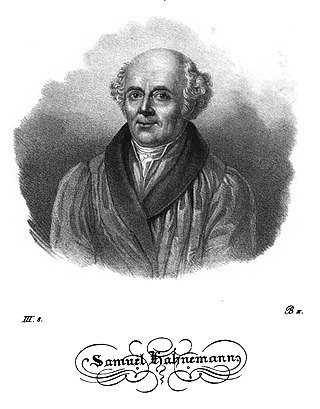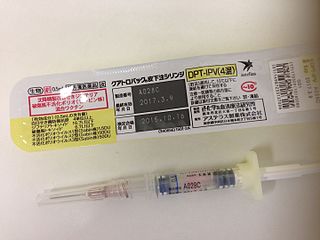
Homeopathy or homoeopathy is a pseudoscientific system of alternative medicine. It was conceived in 1796 by the German physician Samuel Hahnemann. Its practitioners, called homeopaths or homeopathic physicians, believe that a substance that causes symptoms of a disease in healthy people can cure similar symptoms in sick people; this doctrine is called similia similibus curentur, or "like cures like". Homeopathic preparations are termed remedies and are made using homeopathic dilution. In this process, the selected substance is repeatedly diluted until the final product is chemically indistinguishable from the diluent. Often not even a single molecule of the original substance can be expected to remain in the product. Between each dilution homeopaths may hit and/or shake the product, claiming this makes the diluent "remember" the original substance after its removal. Practitioners claim that such preparations, upon oral intake, can treat or cure disease.

Whooping cough, also known as pertussis or the 100-day cough, is a highly contagious, vaccine-preventable bacterial disease. Initial symptoms are usually similar to those of the common cold with a runny nose, fever, and mild cough, but these are followed by two or three months of severe coughing fits. Following a fit of coughing, a high-pitched whoop sound or gasp may occur as the person breathes in. The violent coughing may last for 10 or more weeks, hence the phrase "100-day cough". The cough may be so hard that it causes vomiting, rib fractures, and fatigue. Children less than one year old may have little or no cough and instead have periods when they cannot breathe. The incubation period is usually seven to ten days. Disease may occur in those who have been vaccinated, but symptoms are typically milder.
The Australian Competition and Consumer Commission (ACCC) is the chief competition regulator of the Government of Australia, located within the Department of the Treasury. It was established in 1995 with the amalgamation of the Australian Trade Practices Commission and the Prices Surveillance Authority to administer the Trade Practices Act 1974, which was renamed the Competition and Consumer Act 2010 on 1 January 2011. The ACCC's mandate is to protect consumer rights and business rights and obligations, to perform industry regulation and price monitoring, and to prevent illegal anti-competitive behaviour.

The Competition and Consumer Act 2010 (CCA) is an Act of the Parliament of Australia. Prior to 1 January 2011, it was known as the Trade Practices Act 1974 (TPA). The Act is the legislative vehicle for competition law in Australia, and seeks to promote competition, fair trading as well as providing protection for consumers. It is administered by the Australian Competition & Consumer Commission (ACCC) and also gives some rights for private action. Schedule 2 of the CCA sets out the Australian Consumer Law (ACL). The Federal Court of Australia has the jurisdiction to determine private and public complaints made in regard to contraventions of the Act.
Generation Rescue is a nonprofit organization that advocates the scientifically disproven view that autism and related disorders are primarily caused by environmental factors, particularly vaccines. The organization was established in 2005 by Lisa and J.B. Handley. Today, Generation Rescue is known as a platform for Jenny McCarthy's autism related anti-vaccine advocacy.
Misleading or deceptive conduct is a doctrine of Australian law.
This is a partial list of notable price fixing and bid rigging cases.
Homeoprophylaxis, or homeopathic prophylaxis, is the use of homeopathy, a pseudoscience, as a preventive medicine or immunisation against serious infectious diseases.

Pertussis vaccine is a vaccine that protects against whooping cough (pertussis). There are two main types: whole-cell vaccines and acellular vaccines. The whole-cell vaccine is about 78% effective while the acellular vaccine is 71–85% effective. The effectiveness of the vaccines appears to decrease by between 2 and 10% per year after vaccination with a more rapid decrease with the acellular vaccines. The vaccine is only available in combination with tetanus and diphtheria vaccines. Pertussis vaccine is estimated to have saved over 500,000 lives in 2002.
The Australian Vaccination-risks Network Inc., formerly known as the Australian Vaccination-Skeptics Network (AVsN), and before that known as the Australian Vaccination Network (AVN), is an Australian anti-vaccination pressure group registered in New South Wales. As Australia's most controversial anti-vaccination organisation, it has lobbied against a variety of vaccination-related programs, downplayed the danger of childhood diseases such as measles and pertussis, championed the cause of alleged vaccination victims, and promoted the use of ineffective alternatives such as homeopathy.

Power Balance is the original brand of hologram bracelets claimed by its manufacturers and vendors to use "holographic technology" to "resonate with and respond to the natural energy field of the body" to increase athletic performance. Numerous independent studies of the device have found it to be no more effective than a placebo for enhancing athletic performance. As a result, in 2010, the Australian distributor, Power Balance Australia Pty. Ltd., was forced by the Australian Competition and Consumer Commission (ACCC) to retract any previous claims.
Homeopathy practice is unregulated in New Zealand and homeopathic remedies are available at pharmacies, although there are calls to have them removed from sale.
Trivago N.V., marketed with lowercase styling as trivago, is a German technology company specializing in internet-related services and products in the hotel, lodging and metasearch fields. The company is headquartered in Düsseldorf. The American online travel company Expedia Group owns a majority of the company's stock.
Warnings About Vaccination Expectations NZ (WAVESnz), formerly the Immunisation Awareness Society (IAS), is a New Zealand anti-vaccination lobby group.

The Good Thinking Society is a nonprofit organisation promoting scientific scepticism established by Simon Singh in September 2012.

Catharina Jantina (Catherine) de Jong is a Dutch anesthesiologist, drug rehab physician, intensivist, since 2009 board member of the Vereniging tegen de Kwakzalverij (VtdK), between 2011–2015 as chair, and board member of the European Council of Skeptical Organisations (ECSO).
Nurofen is a brand name range of pain-relief medication containing ibuprofen made by the British multinational Reckitt. Introduced in 1983, the Nurofen brand was acquired following Reckitt Benckiser's acquisition of Boots healthcare international in 2005 for £1.93 billion, which included Nurofen, Strepsils, and Clearasil. The brand is primarily marketed and sold in the United Kingdom, other parts of Europe, South Africa, Australia and New Zealand. In 2016 it was the biggest selling branded over-the-counter medication sold in Great Britain, with sales of £116.8 million.
CEASE therapy is a pseudoscientific practice used by naturopaths who claim that it can treat or even cure people with autism, claims which have been adjudicated by the UK's Advertising Standards Authority as "bogus". It involves a mixture of supplements, high-dose vitamin C, 'orthomolecular support', dietary restrictions, and homeopathy. The therapy was developed by Dutch doctor Tinus Smits, who claimed to have used it to treat over 300 children with autism. It became more notable in 2017/2018 because of regulatory action taken by professional bodies in The Netherlands, UK, and Canada following a series of complaints about unfounded claims.
The Society of Homeopaths (SoH) is a British private limited company formed in 1978 by "a small group of homeopaths who were keen to work together for the development of the profession and to ensure high standards in the practice of homeopathy" and at September 2018 had 997 members on the Society's register who can refer to themselves as RSHoms. The SoH's register was first accredited by the Professional Standards Authority (PSA) in September 2014 allowing members to display the Accredited Register's logo at the time. In January 2021 the PSA suspended the society's accreditation for failure to meet standards the PSA had set.
The infinitesimally low concentration of homeopathic preparations, which often lack even a single molecule of the diluted substance, has been the basis of questions about the effects of the preparations since the 19th century. Modern advocates of homeopathy have proposed a concept of "water memory", according to which water "remembers" the substances mixed in it, and transmits the effect of those substances when consumed. This concept is inconsistent with the current understanding of matter, and water memory has never been demonstrated to exist, in terms of any detectable effect, biological or otherwise.







